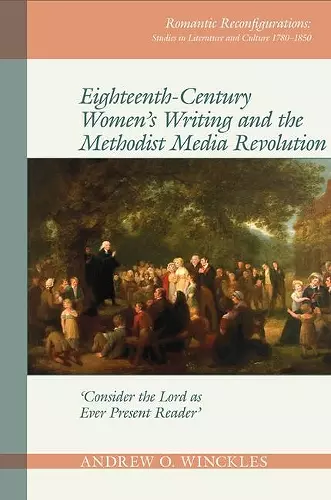Eighteenth-Century Women's Writing and the Methodist Media Revolution
'Consider the Lord as Ever Present Reader'
Format:Paperback
Publisher:Liverpool University Press
Published:1st Aug '22
Currently unavailable, and unfortunately no date known when it will be back

Eighteenth-Century Women’s Writing and the Methodist Media Revolution argues that Methodism in the eighteenth century was a media event that uniquely combined and utilized different types of media to reach a vast and diverse audience. Specifically, it traces particular cases of how evangelical and Methodist discourse practices interacted with major cultural and literary events during the long eighteenth century, from the rise of the novel through the Revolution controversy of the 1790s to the shifting ground for women writers leading up to the Reform era in the 1830s. The book maps the religious discourse patterns of Methodism onto works by authors like Samuel Richardson, Mary Wollstonecraft, Hannah More, Elizabeth Hamilton, Mary Tighe, and Felicia Hemans. This provides not only a better sense of the religious nuances of these authors’ better-known works, but also a fuller consideration of the wide variety of genres in which women were writing during the period, many of which continue to be read as ‘non-literary’. The scope of the book leads the reader from the establishment of evangelical forms of discourse in the 1730s to the natural ends of these discourse structures during the era of reform, all the while pointing to ways in which women – Methodist and otherwise – modified these discourse patterns as acts of resistance or subversion.
Reviews ‘This is an excellent, multi-layered, subtle and innovative reading of religious culture in the long eighteenth century. It points the way to the development of religious history/literary criticism, and will become a key text for our understanding not only of Methodism but of the ways in which religious discourse might be contextualised and read as part of larger cultural shifts.’
Dr Felicity James, Associate Professor in Eighteenth- and Nineteenth-Century Literature at the University of Leicester
'One of the more broadly appealing achievements of this book is to map the ways in which eighteenth- and early nineteenth-century Methodist women, in their fascinating publishing practices, illuminating editorial experiences, and in the very ideas and expression of their writing, resisted, adopted, and variously navigated their way around ‘a proper and regulated discursive space for women’s enthusiastic religion in British life'.
Fiona Macdonald, Wesley and Methodist Studies
‘....Winckles writes about both women’s writing and Methodism with learning and ease. His thesis builds on other recent—indeed, pioneering—scholarship on dissenting women in the period by deepening that scholarly trajectory through careful manuscript work in overlooked archival sources, especially in the burgeoning field of life writing.’
Jeffrey W. Barbeau, Women's Writing
‘This volume’s reassessment of Methodist media through manuscript culture, women’s life-writing and scribal publication – a vibrant interdisciplinary paradigm – sharpens our understanding of the romantic world, elevates figures who have languished for far too long, and continues to decenter and redefine our understanding of romanticisms in unpredictable and exciting ways.
Elizabeth Bishop, Romantic Circles
‘While the mainstream Methodism of the nineteenth century slowed down the Methodist media revolution, Winckles’s rigor and enthusiasm revives it.’
Rebecca Nesvet, ABO: Interactive Journal for Women in the Arts, 1640-1830
'Winckles [...] uses Methodist women’s manuscript circulation to overhaul the field of Romanticism. [...] Winckles’s ambitious argument and thoroughly researched conclusions are mesmerizingly provocative. [...] One of the very welcome contributions Winckles makes to the field of “long” eighteenth-century women’s writing is his insistence on the value of recovering very specifically the “life-writing” of religious women [...] showing how vibrant and diverse the theological differentiation among members of a given religious community could be. [...] a sea change has occurred in the scholarly recognition of the deep resonances and complications among religious networks, eighteenth-century literature, and global feminism.'Samara Cahill, Eighteenth Century Fiction
ISBN: 9781802076899
Dimensions: unknown
Weight: unknown
288 pages